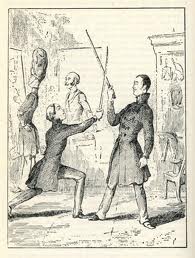Humans as a race have come a long way since our introduction to earth. Today, our world is defined by systematic approaches and specific methods of living. The poem “Sophoclean” by Seamus Heaney touches on some of the historical characteristics of humanity and highlights the elements of our success as a species. A Marxist analysis of the poem reveals the significance of social order by noting that as the man in the poem struggles to improve his social position, his living conditions and general outlook on life improve as well, and when he finally reaches the point when  he is seemingly unmatched, the only things that can stop him are death and social order itself.
he is seemingly unmatched, the only things that can stop him are death and social order itself.
The poem “Sophoclean” follows the life of a man as he struggles to improve his social position and as his social position improves, the man’s general outlook on life and living conditions improve also. In the beginning of the poem, “he [is] shivering on the shore in skins/ Or hunkering behind shell-middens in a cave” (Heaney 1-2) symbolizing the lower class life. Soon, he begins his seemingly heroic quest for a more suitable life as he “[takes] up oars, [puts] tackle on a mast,/ And [steers] himself by the stars through gales” (3-4), demonstrating our need for goals and dreams. Finally, when his journey is complete, “he has mastered thinking” (10) and with this ability, “Roofed his house against hail and rain,/ And worked out laws for living together” (11-12), signifying that the man has felt a sense of purpose as he set his goal, and accomplishment as he achieved his goal. This story of determination and success gives the reader the impression that this type of social order is a healthy system for us to live on.
Although the man seems to be at the top of the social food chain, as soon as he begins to disobey social institutions, everything that he worked for can be taken away. At the top of this food chain, the man “survives every danger except death” (Heaney) and “when truth is the treadle of his loom/ And justice the shuttle, all due honor/ Will come his way” (Heaney). Any person with this amount of power can find trouble for himself or herself if the proper boundaries are not set. The poem demonstrates the importance of social order once again as it warns, “this marvel of the world” (Heaney) that if he ever, “[treats] law/ As something he can decide for himself–/ When he comes begging we will turn our backs” (Heaney). This is a common scenario in our social system today. Even in the most dominant of social classes, social order cannot be disregarded. There must be rules to prevent those who are in power from abusing their power. If there was no such social order, our system would not be functional.
Therefore, social order has all the power to give meaning and pride to life but it also has the power to take these things away if its potential is abused. To a Marxist critic, this fact is demonstrated throughout the poem by constant reference to social phenomena followed by positive consequences. Through these examples, the poem implies a great significance to social order and its healthy, systematic method of improving life.
